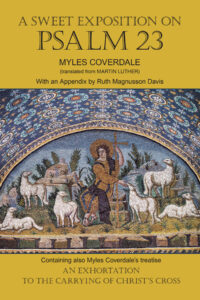A Sweet Exposition on Psalm 23
This book contains Myles Coverdale’s translation of Martin Luther’s essay on Psalm 23. It is a facsimile of the 1846 republication by the Parker Society in modern spelling.
Luther wrote a long commentary on Psalm 23. In it he taught – in accordance with the ancient Christian interpretation, now forgotten – that in Psalm 23 David was speaking about the word of God. The green pasture is the word of God, especially as it is given forth in the church. God’s word is also refreshing water. It is also a cup that is always full. And it is the table that is set before us in the presence of our enemies: what a feast! God’s word is greatly exalted in Luther’s commentary.
The Appendix to the book by Ruth Magnusson Davis shows how the ancient understanding of Psalm 23 was lost to Christendom. It began with John Calvin’s commentary on Psalm 23. Calvin rather shockingly taught that David’s riches and honour were “ladders to God.” He said nothing about God’s word as the means to know him. Then the Geneva Bible, under Calvin’s oversight, changed Psalm 23 to refer to resting in pastures beside still waters, instead of feeding in a pasture with refreshing water as it was in the Matthew Bible (and the other early English Bibles). Also, the new notes in the Geneva Bible said nothing about God’s word.
The KJV adopted the Geneva translation of Psalm 23, and thereafter the ancient understanding was lost.
The Appendix compares the translation and notes of the Matthew Bible with the Geneva version so that people can see the changes in the Geneva Bible. As well, Calvin’s full commentary is attached.
This volume also includes Coverdale’s own treatise, An Exhortation to the Carrying of Christ’s Cross. Coverdale wrote it while under house arrest, after Queen Mary ascended the throne in England. It is a passionate plea to Christians to meet persecution with patience and courage, and discusses the Reformers’ foundational quarrels with certain teachings of Roman Catholicism.
We guarantee no missing, blurred, or damaged pages in all our facsimile books.

